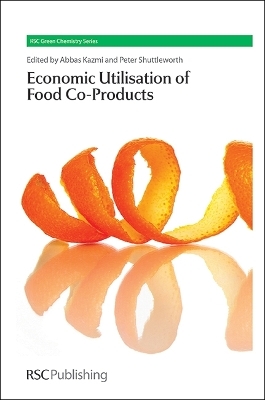
Economic Utilisation of Food Co-Products
Seiten
2013
Royal Society of Chemistry (Verlag)
978-1-84973-615-2 (ISBN)
Royal Society of Chemistry (Verlag)
978-1-84973-615-2 (ISBN)
As the world’s population continues to grow so does the demand for food, and in consequence the amount of material left over from food production. No longer considered simply as "waste", many food co-products are being identified as economically-viable raw materials and their potential is enhanced by modern processing technologies and the biorefinery concept.
This book presents a general overview of the current situation, with perspectives from within the food industry and policy makers in the introductory chapters. These are followed by five chapters exploring modern advanced processing techniques. Further chapters are dedicated to separate food groups, including cereals, oils, rice and fish, exploring the potential for making the best use of the co-products generated.
Many of the processing technologies discussed will be familiar to students and practitioners of green chemistry, but the book goes further in presenting examples and case studies, written by active workers in the field from across the globe. Food technicians and process engineers will be amongst the researchers in academia and industry and postgraduate students this book is aimed for.
This book presents a general overview of the current situation, with perspectives from within the food industry and policy makers in the introductory chapters. These are followed by five chapters exploring modern advanced processing techniques. Further chapters are dedicated to separate food groups, including cereals, oils, rice and fish, exploring the potential for making the best use of the co-products generated.
Many of the processing technologies discussed will be familiar to students and practitioners of green chemistry, but the book goes further in presenting examples and case studies, written by active workers in the field from across the globe. Food technicians and process engineers will be amongst the researchers in academia and industry and postgraduate students this book is aimed for.
Project Manager of Sustoil, a project led by the Green Chemistry Centre of Excellence based at the University of York, UK, from 2008-2010. CSIC, Spain
Green Chemistry and the biorefinery;
International food waste policy;
Advanced Processing Technologies;
Microwave Pyrolysis;
Biochemical conversion of food waste;
Anaerobic digestion;
Case Studies;
Uses of waste: Starch;
High value applications of Used Cooking Oil;
Materials from Rapeseed and Sunflower meal and cake
| Reihe/Serie | Green Chemistry Series ; Volume 24 |
|---|---|
| Verlagsort | Cambridge |
| Sprache | englisch |
| Maße | 156 x 234 mm |
| Gewicht | 513 g |
| Themenwelt | Naturwissenschaften ► Biologie ► Ökologie / Naturschutz |
| Naturwissenschaften ► Chemie | |
| Technik ► Lebensmitteltechnologie | |
| Technik ► Umwelttechnik / Biotechnologie | |
| ISBN-10 | 1-84973-615-4 / 1849736154 |
| ISBN-13 | 978-1-84973-615-2 / 9781849736152 |
| Zustand | Neuware |
| Informationen gemäß Produktsicherheitsverordnung (GPSR) | |
| Haben Sie eine Frage zum Produkt? |
Mehr entdecken
aus dem Bereich
aus dem Bereich
Grundlagen, Systeme, Anwendung, Wirtschaft
Buch | Hardcover (2024)
Carl Hanser (Verlag)
99,99 €


